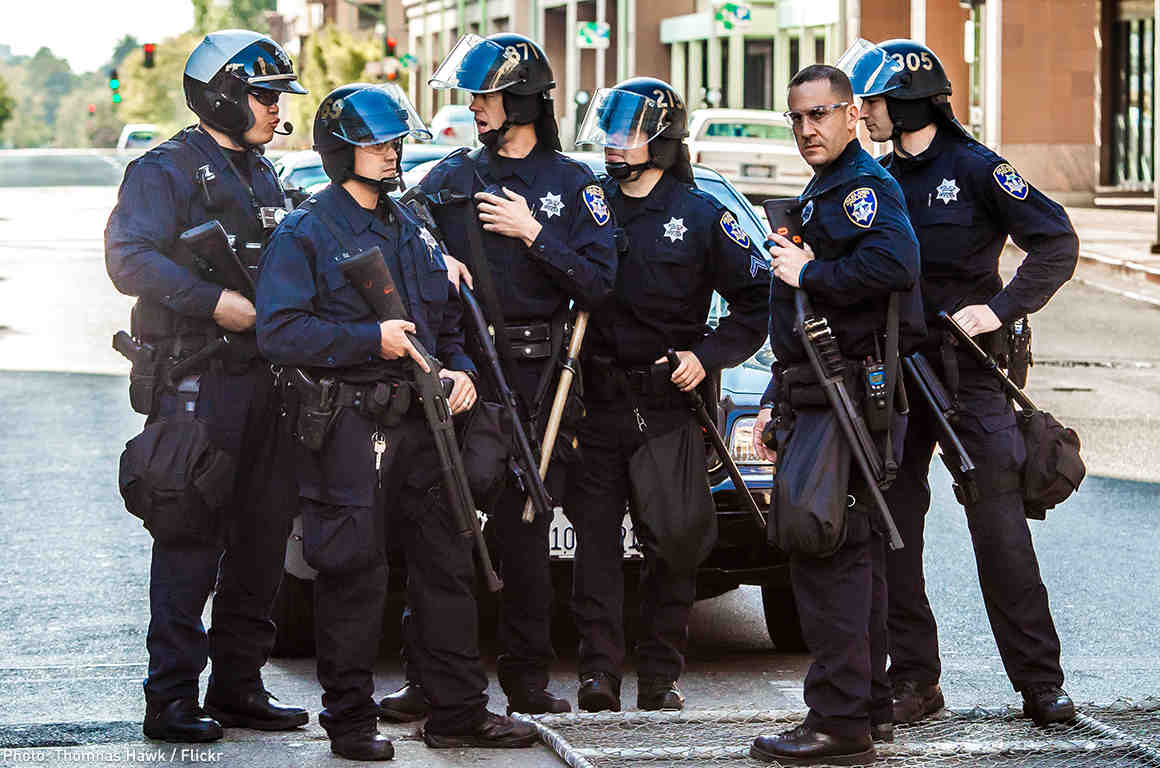
By Neill Franklin
This week, the Trump administration revoked President Obama’s Executive Order 13688, which limited the scope of a federal program that allows state and local police departments to obtain military equipment free of charge – and without oversight or training in how to use it. After spending 34 years as a police officer, I’m convinced that the 1033 Program has been one of the single greatest contributors to the public losing trust in law enforcement.
Scrapping Executive Order 13688 means police departments will again have unfettered access to high caliber guns, grenade launchers, and armored vehicles, among other forms of military equipment. During a time when criminal justice and police reform have bipartisan support, this decision shows a clear misunderstanding both of what Americans want and, more perilously, of what’s truly effective at improving public safety.
Scenes from Ferguson, Missouri, helped create better awareness of the 1033 Program throughout the country. The public demanded to know why police who were sent to keep the peace during a protest were indistinguishable from soldiers at war. This is not the peace officer I was trained to be when I joined the force.
Beyond causing terror in individuals and families whose homes are raided with police armed with military weapons, the use of such equipment for regular police work damages police-community 
relations. Militarization has eroded public trust in police, the effectiveness of law enforcement overall, and ultimately, public safety.
Officers need to engage in crime prevention and crime fighting activities that work. They do not need to participate in programs that waste resources and create dangerous situations for both law enforcement and the public. In the SWAT raids studied by the ACLU for its 2013 report, War Comes Home, 79 percent of SWAT deployments were issued to execute search warrants, mostly for drugs. Somewhere between 36 and 65 percent of those drug searches resulted in no discovery of illegal contraband. Even if everything goes smoothly and nobody gets injured or killed during a raid, it’s still an enormous waste of time and extremely dangerous for both officers and civilians.
An all-too-common SWAT scenario is one where SWAT’s involvement escalates a nonviolent situation into a deadly one. Imagine that you are awoken at dawn by the sound of men shouting and battering down your door. You can’t hear what the voices are saying, but you realize your home is being invaded. Your instinct tells you to grab your lawfully owned gun and face the intruders. You race downstairs and make it to the front door only to find the intruders are police – and they think you have drugs. The police are scared of an armed man running toward them, and you’re barely awake. You’re confused. And then shots are fired. Nobody remembers who pulled the trigger first.
With each of these incidents, public trust in the police erodes. Research shows people who don’t trust police are less likely to report a crime, and I can tell you from experience it makes them much less likely to cooperate in investigations. Without the community to help us, police work — the hard work of solving rapes and homicides and kidnappings — becomes nearly impossible. This means our “crime reduction” strategy of deploying SWAT teams is paradoxically creating an environment in which it’s harder for police to solve crimes and protect people.
My philosophy is instead guided by the Nine Principles of Policing set forth by Sir Robert Peel and his commissioners nearly 200 years ago, which have set the standard ever since. The very first principle is “to prevent crime and disorder, as an alternative to their repression by military force….” I support replacing the 1033 Program with one in which officers must demonstrate competence, be trained in proper equipment usage, and may only use military equipment for hostage, active shooter, and barricade scenarios. I believe this because I became a police officer to protect people. When people fear the police more than they fear crime itself, the legitimacy of the career I loved so much becomes meaningless.
Neill Franklin is a retired police major and the Executive Director of the Law Enforcement Action Partnership.






This message carries weight coming from an experienced police officer. I hope it is a message that will be heard by our current law enforcement at all levels, but most especially at the national level.
Neil Franklin is a retired police mayor and the Executive Director of the Law Enforcement Action Partnership.
Any relation to
“Major Neill Franklin”?
Jim, I almost was not even able to look at the articles today, as I was part of getting a very good friend to the ER for the 2nd time in less than 24 hours. I just got home for a break a little while ago, and on this piece I immediately saw Neill (and Neil) and checked the spelling…then also knew he is a retired police major. The guest ACLU articles I do not normally touch, except for our title and our short bio. And remember, VG is non-profit and I am one of the volunteers.
Cathy A
Hi Cathy,
Did not mean to be offensive, I’ll just ignore them going forward.
The ACLU advocacy pieces are generally the most poorly written on TDV though often this is due to insufficient cognition.
Jim
Thanks, Jim, just saying I try to do whatever I can…
cathy a
It’s a sad truth that people fear police as much as crime nowadays. Training and screening need work. Crime prevention is spot on….
i still think more effort needs to be made for police to have friendlier relations with the most challenged groups in the areas they serve. Peaceful community service to those groups needs to be part of their training. I think it would make a big difference. A much better one than better equipping officers to harm them.
Heroes, not villains and bullies. Heroes. What happened?